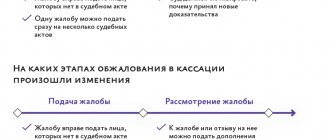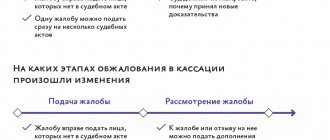The legal term “Appeal” means an appeal against judicial decisions that have not entered into legal force in civil or criminal proceedings.
The appeal can be complete or incomplete. A full appeal involves a complete review of the entire case from the beginning, in accordance with the rules provided for trial courts.
In case of an incomplete appeal, the case is reviewed solely on the basis of the arguments of the appeal.
Cassation (cassation appeal) is understood as an appeal, protest or reversal of a court verdict passed in a higher court.
Appeal against decisions
By way of appeal, decisions of the court of first instance that have not entered into legal force are appealed.
An appeal can only be filed through the court where the verdict was rendered.
It is allowed to file an appeal within 1 month from the moment the court decision is made in final form.
The Court of Appeal considers the case within the framework of the arguments presented in the appeal. The document must contain:
- the name of the court where the complaint is filed;
- the name of the person who applied to the said authority, indicating his place of residence or location;
- an indication of the court decision subject to appeal;
- the requirement of the person who filed the complaint and the basis on which the subject considers the court verdict to be incorrect;
- list of documents attached to the main one.
The appeal is signed by the person filing the claim or his representative (which must be confirmed by a power of attorney). Documentary evidence of payment of the state duty (if payable) is attached to the complaint.
The appeal should not contain claims that were not stated in the court of first instance. Referring to new evidence is allowed only if the impossibility of presenting it in the court of first instance is substantiated.
Courts of general jurisdiction (with the exception of the Supreme Court of the Russian Federation) are required to consider submitted documents within a period not exceeding two months from the date the case is received by the court.
The appeal is being considered by the Supreme Court of the Russian Federation for 3 months.
Appeals and cassation complaints against sentences and decisions in civil cases: general recommendations
Home Press center Appeals and cassation complaints against sentences and decisions in civil cases: general recommendations
People sometimes turn to me for legal assistance when the case has already gone through not only the first instance, but also an appeal, and even the so-called “first” cassation. Unfortunately, an analysis of civil and criminal cases shows that in many cases previously filed complaints turn out to be simply poorly drafted, but at the same time, one or another instance of appeal has already been formally passed, and going to a new round of appeal is impossible or simply pointless. Therefore, we have to abandon an initially perhaps promising, but already ruined business. The reasons why people often rely on their own efforts to file complaints and litigate cases are clear. Some, for example, believe that in the first or second instance they can sue on their own, and if the result does not suit them, then it is worth contacting a lawyer. At the same time, they lose sight of the fact that it is better to conduct the case efficiently in the court of first instance, than to later appeal to higher authorities. An appeal can also yield results, but one of the conditions for this is a well-prepared complaint. Those who have not encountered at all or occasionally encountered appeals against judicial acts simply do not know by what “laws of the genre” a complaint is based, which arguments are important and which are not. I decided to outline some basic recommendations that will help you avoid “school” mistakes if you still decide to write a complaint yourself - without the help of a lawyer. At the same time, it is important to remember that for a more in-depth study of a specific complaint, you always need to know the materials of a specific case, be able to analyze them from a legal point of view, and have a good command of the relevant judicial practice at the regional level and the Supreme Court of the Russian Federation.
- First of all, you need to know the deadlines for filing appeals and cassation complaints. You can be as right as you like in the essence of the dispute, but if you missed the deadline for filing a complaint, it will not even be considered on its merits. An exception is cases when the deadline for filing a complaint is restored. This issue is decided at the discretion of the court, which assesses the validity of the reasons for missing the deadline. No one will restore the deadline if it was missed due to ignorance, forgetfulness, illiteracy, etc. There must be really compelling reasons for the court to restore the missed deadline for filing an appeal or cassation complaint.
Main deadlines for appealing decisions in civil cases :
- The appeal must be filed within a month from the date of the decision of the court of first instance in final form (unless otherwise provided by law).
- For both cassation appeals (in the “first” and “second” cassation), a total period of 6 months has been established from the date of entry into force of the appealed judicial acts. Moreover, if the decision has not previously been appealed (including if the deadline for filing an appeal has been missed), there is no point in writing to the cassation authority; the appeal will be returned without consideration.
- A complaint to the European Court of Human Rights can be filed within 6 months after the “second” cassation has been completed (in the Supreme Court of the Russian Federation). The missed 6-month period is not restored.
The main deadlines for appealing sentences and other judicial acts in criminal cases :
- An appeal against the verdict must be filed within 10 days from the day the verdict was announced, and if the convicted person was kept in custody - from the day he was given a copy of the verdict;
- The decision on the preventive measure must be appealed within 3 days from the date of the decision.
- There are no deadlines for filing cassation appeals by convicts and defense lawyers. A cassation appeal in a criminal case may be considered by the court even in the case where the judicial act has not been appealed.
- A complaint to the European Court of Human Rights can be filed within 6 months after the verdict or ruling has entered into force after passing the appeal court. The missed 6-month period is not restored.
Important! There is no need to be afraid to write complaints about sentences and fear that because of this they may tighten the punishment or otherwise worsen the situation of the convicted person, including after the sentence is overturned and the case is reconsidered. If the complaint is filed only by the convicted person or his lawyer (i.e., the prosecutor and the victim have not appealed the verdict), the higher court (as well as the court of first instance, if the case is returned for a new trial after the judicial act has been annulled) cannot worsen the situation of the convicted person.
- When appealing, it is important to understand the competence of each authority. In an appeal, evidence in a criminal or civil case can be analyzed, but new evidence can only be presented if it could not be presented to the trial court for good reasons. If they were not presented to the court of first instance due to forgetfulness, illiteracy, etc. - these are not valid reasons. There is also no need to hope that the appellate court will order an additional or repeat examination - these are the rarest cases in judicial practice.
The cassation court considers only questions of law. Therefore, there is no point in writing in a cassation appeal, for example, that the testimony of witnesses is unreliable, that the methodology was not followed during the examination, etc. For the cassation court, only significant violations in the application of substantive or procedural law are important.
A complaint to the European Court of Human Rights must contain only a statement of the circumstances and violations committed in the case precisely in the context of the European Convention for the Protection of Human Rights and Fundamental Freedoms, the practice of the ECHR itself, and not Russian legislation.
- Understand what result you want to get from the complaint: cancel the decision/sentence, reconsider the case on the merits as a whole, achieve reclassification to a lesser crime or reduce the punishment, prepare the case for a subsequent complaint to the ECHR.
For example, complaints in which the convicted person first writes about his complete innocence and gives arguments in favor of this, and then points out mitigating circumstances and refers to too harsh a punishment, look unconvincing.
- It is necessary to write only strong arguments - without emotions, “water” and “collecting” minor technical errors.
If a person writes an appeal or cassation complaint against a decision in a civil case or a sentence in a criminal case without the help of a qualified lawyer, he, as a rule, tries to set out in it his emotional attitude towards the judicial acts being appealed, and technical errors in paperwork, and substantive arguments affairs. At the same time, legal arguments are not ranked, but presented haphazardly. This impairs the readability of the complaint, and, in addition, allows the reviewing court to first easily “beat off” weak arguments by describing the main motivation for them, and then “sweep the remaining strong arguments under the rug.”
A well-written appeal or cassation complaint, firstly, includes only legal arguments without “water” and emotional passages, and, secondly, contains a ranking of these arguments by their strength: first the strongest, then in descending order (minor and insignificant violations are not indicated at all).
- There is no need to quote regulations extensively. If you can only give a link to an item, part, article, without citing its content, do so. Quote the practice of the ECHR, the Constitutional Court of the Russian Federation or the Supreme Court of the Russian Federation selectively - briefly and only in relation to your question. Do not quote the practice of other courts, but simply provide a link indicating the details or, as a last resort, attach copies of these judicial acts to the complaint.
- If in your complaint you refer to evidence or any documents, indicate the sheets of the case. It is extremely important to be able to analyze evidence and relate it to each other, without jumping from one circumstance to another and without duplicating the same argument in different parts of the complaint.
- Write as briefly as possible. The essence of the violation committed by the court, as a rule, can be expressed in one short sentence. Everything else is an expansion of this thesis.
The volume of the complaint, most often, does not indicate the number of violations committed, but the inability to briefly and convincingly state one’s position and select really important arguments for the complaint. The principle “the more written, the better” does not work when drawing up and filing appeals and cassation complaints. Remember that no one will read into long, unstructured complaints, and their consideration will be purely formal.
The implementation of these recommendations in specific cases and the general approach of lawyer M.A. Nikonov You can evaluate the drafting of legal documents by studying examples of appeals against the extension of detention and the denial of parole, as well as some cases from the practice of a lawyer.
If you need the help of a lawyer in criminal, family, or civil law, you can call 8-910-188-73-21 or write by email or telegram.
8-910-188-73-21 all methods of communication
Article 389.6 of the Code of Criminal Procedure of the Russian Federation. Appeal, submission (current version)
1. An appeal or presentation must contain:
1) the name of the appellate court to which the complaint or presentation is filed;
2) information about the person who filed the appeal or presentation, indicating his procedural status, place of residence or location;
3) an indication of the verdict or other court decision and the name of the court that decided or issued it;
4) the arguments of the person who filed the appeal or presentation, indicating the grounds provided for in Article 389.15 of this Code;
5) a list of materials attached to the appeal or presentation;
6) signature of the person who filed the appeal or presentation.
1.1. The person who filed the appeal or presentation, in support of the arguments presented in the complaint or presentation, has the right to file a petition for the court of appeal to examine the evidence that was examined by the court of first instance, which must be indicated in the complaint or presentation, and provide a list of witnesses, experts and others persons subject to summons for this purpose to the court hearing. If a request is made to examine evidence that was not examined by the court of first instance (new evidence), then the person is obliged to justify in the appeal or presentation the impossibility of presenting this evidence to the court of first instance.
2. The appeal of a person not participating in the criminal case must indicate what rights and legitimate interests of this person were violated by the court decision.
3. If a convicted person applies for participation in the consideration of a criminal case by an appellate court, this is indicated in his appeal or in objections to complaints and submissions brought by other participants in the criminal process.
4. If the appeal or presentation does not comply with the requirements established by parts one, one.1 and second of this article, which prevents the consideration of the criminal case, the appeal or presentation is returned by the judge, who sets a deadline for their re-drafting. If the judge’s requirements are not met and the appeal or presentation is not received within the time limit set by the judge, they are considered not filed. In this case, the verdict or other appealed court decision is considered to have entered into legal force.
How to clarify your position during a case in court
The company wants to file an appeal or cassation with additional justification for its position, which will help overturn the court decision. It is not clear how to add additions, because the APC does not establish special rules for this. In such a situation, it is necessary to rely on the opinion of the courts. The article contains three rules from practice; adhere to them so that the court accepts additional arguments.
Send additions to the other side of the dispute
Companies that submit additional arguments to the court for complaints are required to show them to all participants in the case. That is, it is necessary to send additions to other participants, including the second party to the dispute, so that it has time to prepare arguments in defense.
It is risky not to send additional arguments to opponents in a dispute, since the courts believe that in this case the company is violating the procedural order and refuse to accept the additions. Example: a company went to court to recover lost profits from the defendant and lost. When the case was reconsidered, she submitted additions to the complaint to the court, but it did not accept them. The reason for the refusal was that the company did not send them to the defendant, thereby violating the principles of adversarial arbitration.
When you begin to send additional arguments to the other side, keep evidence that you did this. For example, if you send paper materials by mail, do not throw away the mailing receipt. Ask the other party to send confirmation of receipt of the letter. The court may not accept additions to the complaint if the company does not prove that it sent them to other parties to the dispute.
Sometimes the court may accept additional arguments to the complaint, even if the applicant did not send them to the other party. Then the judges will give all participants in the case time to familiarize themselves with the additions and prepare objections to new arguments. To do this, the court, at the request of the party, will announce a break or postpone consideration of the complaint for a while.
Why is the court’s obligation to send copies of appeals to the participants in the case unnecessary?
On October 1, changes to the Code of Civil Procedure of the Russian Federation came into effect, introduced by Federal Law No. 451-FZ of November 28, 2021 (as amended on July 26, 2021).
Among other amendments to Art. 322 of the Code of Civil Procedure of the Russian Federation was supplemented by the obligation of the appellant to attach to the appeal a document confirming the sending or delivery to other persons participating in the case of copies of the appeal and documents attached to it that they do not have, including if they are submitted by filling out a form posted on the website the relevant court.
This practice is not new. Even in the first edition of the Arbitration Procedure Code of the Russian Federation in 2002 (Article 260), the obligation was established to attach to the appeal a document confirming the sending or delivery to other persons participating in the case of copies of this complaint and the documents attached to it, which they do not have.
Apparently, one of the goals pursued by the legislator when borrowing the rules of arbitration legislation from civil procedure legislation is to unload the workload of courts of general jurisdiction. It is no secret that in the latter, the office sometimes does not have time to send correspondence on time, and the parties receive appeals when the deadline for filing objections to the arguments of the complaint has expired or when it has already been sent to the court of appeal.
In this regard, it seems to be a very correct decision of the legislator to oblige the appellant, before filing a complaint, to forward it to the persons involved in the case. This guarantees respect for the rights and interests of all participants in the process.
Only the obligation of the court to send copies of appeals to the persons participating in the case is absent in the Arbitration Procedure Code of the Russian Federation, but it is provided for in the Code of Civil Procedure of the Russian Federation.
Let me remind you that the previous version of Art. 322 of the Code of Civil Procedure of the Russian Federation, where Part 5 indicated the need to attach to the appeal copies of complaints, presentations and documents attached to them according to the number of persons participating in the case. Therefore, Art. looked logical. 325 of the Code, which stated that the court of first instance, after receiving the said complaint filed under Art. 321 term and corresponding to the requirements of Art. 322, is obliged to send copies of the complaint, presentation and documents attached to them to the persons participating in the case.
After amendments were made to Art. 322 of the Code of Civil Procedure of the Russian Federation, this obligation seems unnecessary, leading to additional costs for the court, since the persons participating in the case receive copies of appeals twice - first from the appellant, and then from the court.
In practice, a situation arises when courts illegally leave appeals without progress, citing failure to fulfill the obligation to attach copies of the number of persons participating in the case. Undoubtedly, such determinations must be appealed, but this will lead to prolongation of the proceedings, which can be extremely disadvantageous for the principal.
When accepting appeals under the new rules (that is, without copies), the courts are forced not only to send them, as was the case before the amendments, but also to make copies of them at their own expense, wasting time.
The question arises, what did the legislator change in this case?
In my opinion, it is advisable to exclude the provisions established in Art. 325 of the Code of Civil Procedure of the Russian Federation is the duty of the court to send copies of appeals. Otherwise, the goal pursued by the legislator will not be achieved, and instead of unloading the courts, we will get an even greater workload, as well as additional costs for making copies of appeals.
However, with such a solution another difficulty arises. How does the opposite party know whether the appeal complies with the requirements of the law and whether the court has left it without progress? If the complaint meets all the requirements, the other party should also know the deadline for filing objections.
Before introducing the amendments under consideration, the opposite party received from the court a copy of the appeal, which had already passed legal verification and was recognized by the court as meeting the requirements of the law. At the same time, the court also indicated by what date objections must be raised.
From October 1, the persons involved in the case receive a complaint from the appellant, but in practice it may not reach the court, since it will not meet the requirements. It seems that it makes no sense to spend money and time preparing objections to such an appeal.
In arbitration courts this problem is solved quite simply. According to Art. 261 of the Arbitration Procedure Code of the Russian Federation, the issue of accepting an appeal for proceedings is decided by the judge of the arbitration court of the appellate instance alone within five days from the date of its receipt by the court. A ruling is issued on the acceptance of the complaint, which initiates proceedings on the complaint. The determination also indicates the time and place of the court hearing to consider the complaint, while the time for the first meeting is set taking into account the fact that it cannot be held before the expiration of the period established by the Arbitration Procedure Code of the Russian Federation for appealing the relevant decision. Copies of the ruling on acceptance of the complaint are sent to the persons participating in the case no later than the next day after the day it was issued.
Thus, the trial court does not need to direct anything to the parties. Its tasks should only include sending a complaint with the case materials to the appellate court - the rest is entrusted to the appellate court.
In accordance with Part 2 of Art. 257 of the Arbitration Procedure Code of the Russian Federation, this is what happens - an appeal is filed through the arbitration court that made the decision in the first instance, which is obliged to send it along with the case to the appellate instance within three days from the date the complaint was received by the court.
To summarize, it should be pointed out that it is not enough to assign the responsibility for filing an appeal to the appellant - this issue must be approached carefully and carefully so that the changes are systemic, coherent in nature, and do not introduce confusion and nonsense.








